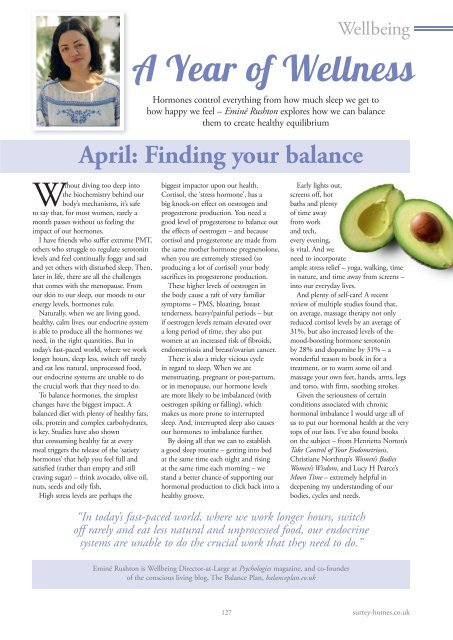Surrey Homes | SH54 | April 2019 | Garden supplement inside
The lifestyle magazine for Surrey - Inspirational Interiors, Fabulous Fashion, Delicious Dishes
The lifestyle magazine for Surrey - Inspirational Interiors, Fabulous Fashion, Delicious Dishes
Create successful ePaper yourself
Turn your PDF publications into a flip-book with our unique Google optimized e-Paper software.
Wellbeing<br />
A Year of Wellness<br />
Hormones control everything from how much sleep we get to<br />
how happy we feel – Eminé Rushton explores how we can balance<br />
them to create healthy equilibrium<br />
<strong>April</strong>: Finding your balance<br />
Without diving too deep into<br />
the biochemistry behind our<br />
body’s mechanisms, it’s safe<br />
to say that, for most women, rarely a<br />
month passes without us feeling the<br />
impact of our hormones.<br />
I have friends who suffer extreme PMT,<br />
others who struggle to regulate serotonin<br />
levels and feel continually foggy and sad<br />
and yet others with disturbed sleep. Then,<br />
later in life, there are all the challenges<br />
that comes with the menopause. From<br />
our skin to our sleep, our moods to our<br />
energy levels, hormones rule.<br />
Naturally, when we are living good,<br />
healthy, calm lives, our endocrine system<br />
is able to produce all the hormones we<br />
need, in the right quantities. But in<br />
today’s fast-paced world, where we work<br />
longer hours, sleep less, switch off rarely<br />
and eat less natural, unprocessed food,<br />
our endocrine systems are unable to do<br />
the crucial work that they need to do.<br />
To balance hormones, the simplest<br />
changes have the biggest impact. A<br />
balanced diet with plenty of healthy fats,<br />
oils, protein and complex carbohydrates,<br />
is key. Studies have also shown<br />
that consuming healthy fat at every<br />
meal triggers the release of the ‘satiety<br />
hormones’ that help you feel full and<br />
satisfied (rather than empty and still<br />
craving sugar) – think avocado, olive oil,<br />
nuts, seeds and oily fish.<br />
High stress levels are perhaps the<br />
biggest impactor upon our health.<br />
Cortisol, the ‘stress hormone’, has a<br />
big knock-on effect on oestrogen and<br />
progesterone production. You need a<br />
good level of progesterone to balance out<br />
the effects of oestrogen – and because<br />
cortisol and progesterone are made from<br />
the same mother hormone pregnenolone,<br />
when you are extremely stressed (so<br />
producing a lot of cortisol) your body<br />
sacrifices its progesterone production.<br />
These higher levels of oestrogen in<br />
the body cause a raft of very familiar<br />
symptoms – PMS, bloating, breast<br />
tenderness, heavy/painful periods – but<br />
if oestrogen levels remain elevated over<br />
a long period of time, they also put<br />
women at an increased risk of fibroids,<br />
endometriosis and breast/ovarian cancer.<br />
There is also a tricky vicious cycle<br />
in regard to sleep. When we are<br />
menstruating, pregnant or post-partum,<br />
or in menopause, our hormone levels<br />
are more likely to be imbalanced (with<br />
oestrogen spiking or falling), which<br />
makes us more prone to interrupted<br />
sleep. And, interrupted sleep also causes<br />
our hormones to imbalance further.<br />
By doing all that we can to establish<br />
a good sleep routine – getting into bed<br />
at the same time each night and rising<br />
at the same time each morning – we<br />
stand a better chance of supporting our<br />
hormonal production to click back into a<br />
healthy groove.<br />
Early lights out,<br />
screens off, hot<br />
baths and plenty<br />
of time away<br />
from work<br />
and tech,<br />
every evening,<br />
is vital. And we<br />
need to incorporate<br />
ample stress relief – yoga, walking, time<br />
in nature, and time away from screens –<br />
into our everyday lives.<br />
And plenty of self-care! A recent<br />
review of multiple studies found that,<br />
on average, massage therapy not only<br />
reduced cortisol levels by an average of<br />
31%, but also increased levels of the<br />
mood-boosting hormone serotonin<br />
by 28% and dopamine by 31% – a<br />
wonderful reason to book in for a<br />
treatment, or to warm some oil and<br />
massage your own feet, hands, arms, legs<br />
and torso, with firm, soothing strokes.<br />
Given the seriousness of certain<br />
conditions associated with chronic<br />
hormonal imbalance I would urge all of<br />
us to put our hormonal health at the very<br />
tops of our lists. I’ve also found books<br />
on the subject – from Henrietta Norton’s<br />
Take Control of Your Endometriosis,<br />
Christiane Northrup’s Women’s Bodies<br />
Women’s Wisdom, and Lucy H Pearce’s<br />
Moon Time – extremely helpful in<br />
deepening my understanding of our<br />
bodies, cycles and needs.<br />
“ In today’s fast-paced world, where we work longer hours, switch<br />
off rarely and eat less natural and unprocessed food, our endocrine<br />
systems are unable to do the crucial work that they need to do.”<br />
Eminé Rushton is Wellbeing Director-at-Large at Psychologies magazine, and co-founder<br />
of the conscious living blog, The Balance Plan, balanceplan.co.uk<br />
127 surrey-homes.co.uk


















